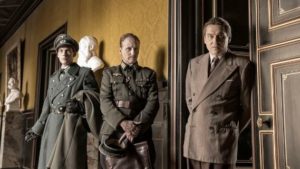 Russian director Alexander Sokurov is in a category by himself, straddling the line between fiction and nonfiction, poetry and prose. In previous shows I’ve scratched the surface of his work, with reviews of Mother and Son from ‘97 and Russian Ark from 2002, but his astonishing career has spanned four decades and over fifty films, all in the service of a personal vision that combines an austere spirituality with a tragic sense of history. His latest film is called Francofonia, which takes as its subject the Louvre, the great museum in Paris, and how it was saved from being looted during the German occupation in the 1940s. But from this starting point Sokurov ranges far and wide.
Russian director Alexander Sokurov is in a category by himself, straddling the line between fiction and nonfiction, poetry and prose. In previous shows I’ve scratched the surface of his work, with reviews of Mother and Son from ‘97 and Russian Ark from 2002, but his astonishing career has spanned four decades and over fifty films, all in the service of a personal vision that combines an austere spirituality with a tragic sense of history. His latest film is called Francofonia, which takes as its subject the Louvre, the great museum in Paris, and how it was saved from being looted during the German occupation in the 1940s. But from this starting point Sokurov ranges far and wide.
The word “documentary” is inadequate to describe this picture. A better term might be “film essay.” Sokurov, who narrates the movie, can go where his intellect and imagination leads him, talking to the audience as if in private, unlike the usual narrator of documentaries who assumes a voice of public objectivity. Allowed complete access to the halls of the Louvre, Sokurov shows us many of the beautiful portraits while musing on the European tradition’s need to memorialize the human face. A sequence on the long history of the building of the museum accompanies thoughts on the genius of Western art allied with the immemorial lust for war and conquest that filled the West’s museums. Napoleon, who makes an appearance in the film, acquired much of the art during his wars, including the vast holdings from ancient Egypt and Assyria. When we are shown a 9,000 year old statue from Jordan, we are reminded of the destruction visited on ancient ruins by bombs and fanatics today.
The film’s main thread, concerning the Nazis’ entry into Paris, combines actual historical footage with clever reenactments that are made to look like old films, complete with a soundtrack squiggle on the left side of the frame. Two men meet to discuss the management of the Louvre during the occupation, Count Franz Wolf-Metternich, in charge of cultural affairs for the Germans, and Jacques Jaujard, the director of the Louvre. Most of the paintings have been smuggled out to safety already, but the Germans easily discover where they were. The disguised, unspoken partnership between the German officer and the French bureaucrat becomes a kind of safe enclave in the midst of barbarity. Wolf-Metternich keeps making little delays in carrying out Hitler’s orders, delays that prevent the theft of the Louvre’s artworks.
Like a good essayist, the director makes a lot of thought-provoking observations, such as when he compares the Germans of the time to hard-hearted children, with no parents to guide them, because they had all died in World War I. Sokurov’s explorations lead him to a choice between surrender, and saving the treasures that have somehow come to represent Europe itself, or fighting on against the evil while perhaps sacrificing those treasures. He contrasts the terrible fate of his own homeland, Russia, whose culture the Nazis despised, epitomized by the horror of the siege of Leningrad, in which millions died of cold and starvation. But without Russia’s resistance, where would we all be now?
The director also steps back and shows himself in the midst of making the picture, while in sporadic contact with a friend, a ship’s captain, carrying priceless artwork across the sea in perilous storms. Throw the cargo overboard, or keep going? This self-observant technique is only one of many dazzling strategies employed in this wise and beautiful film. Francofonia resurrects the 20th century’s tragic history so that we may understand better our own time.

